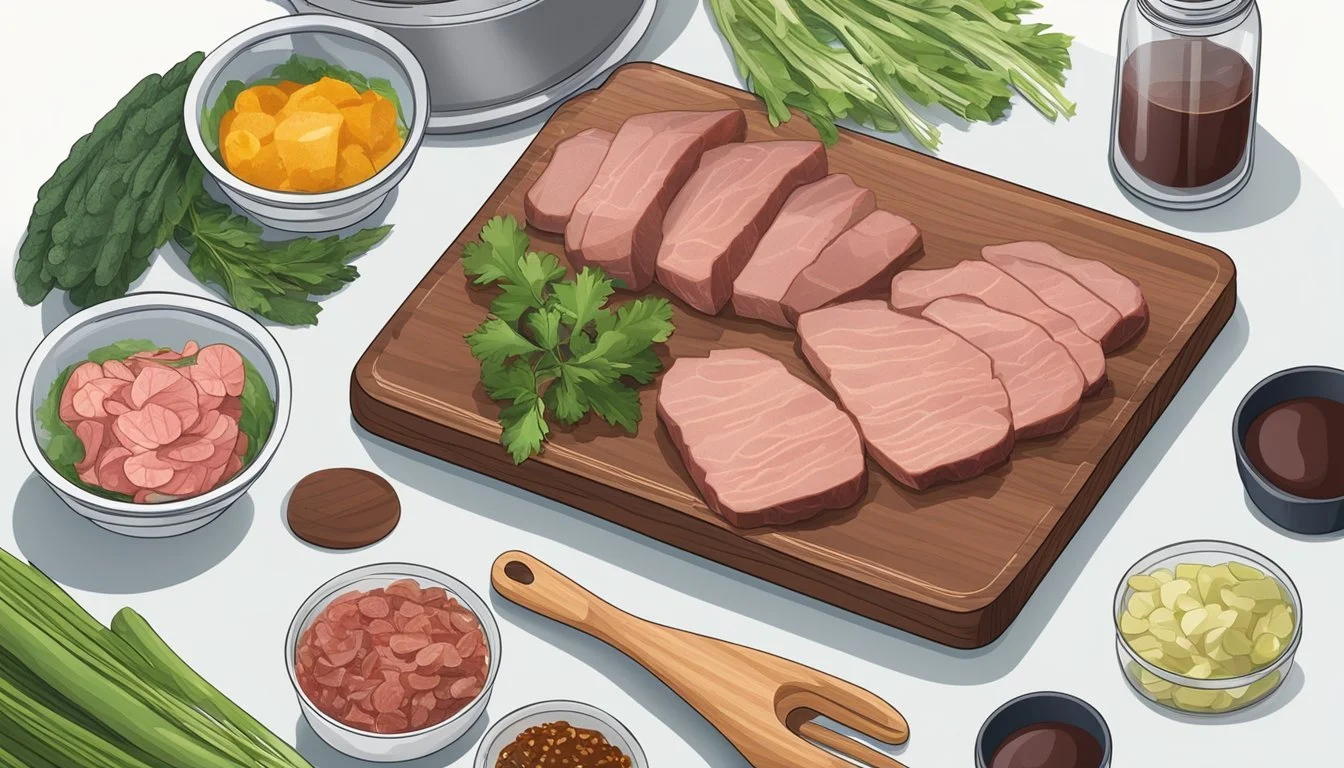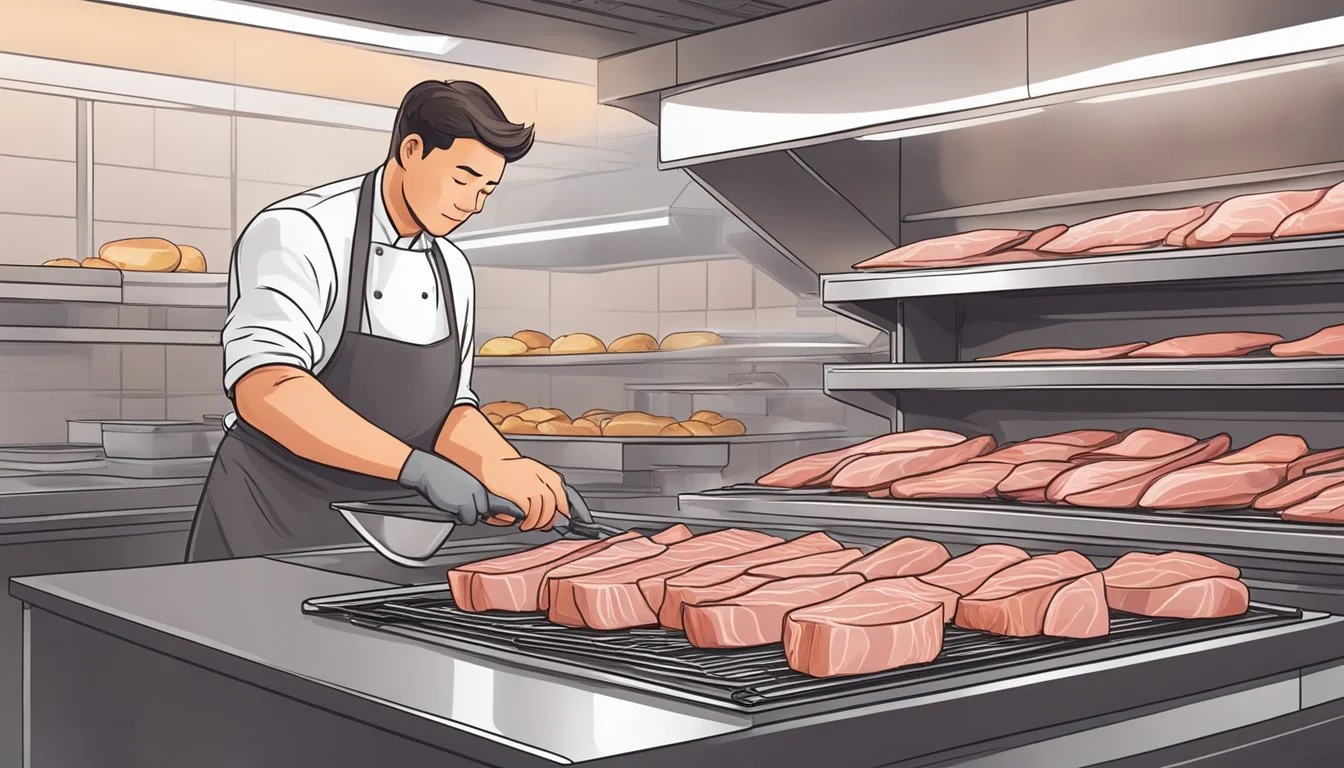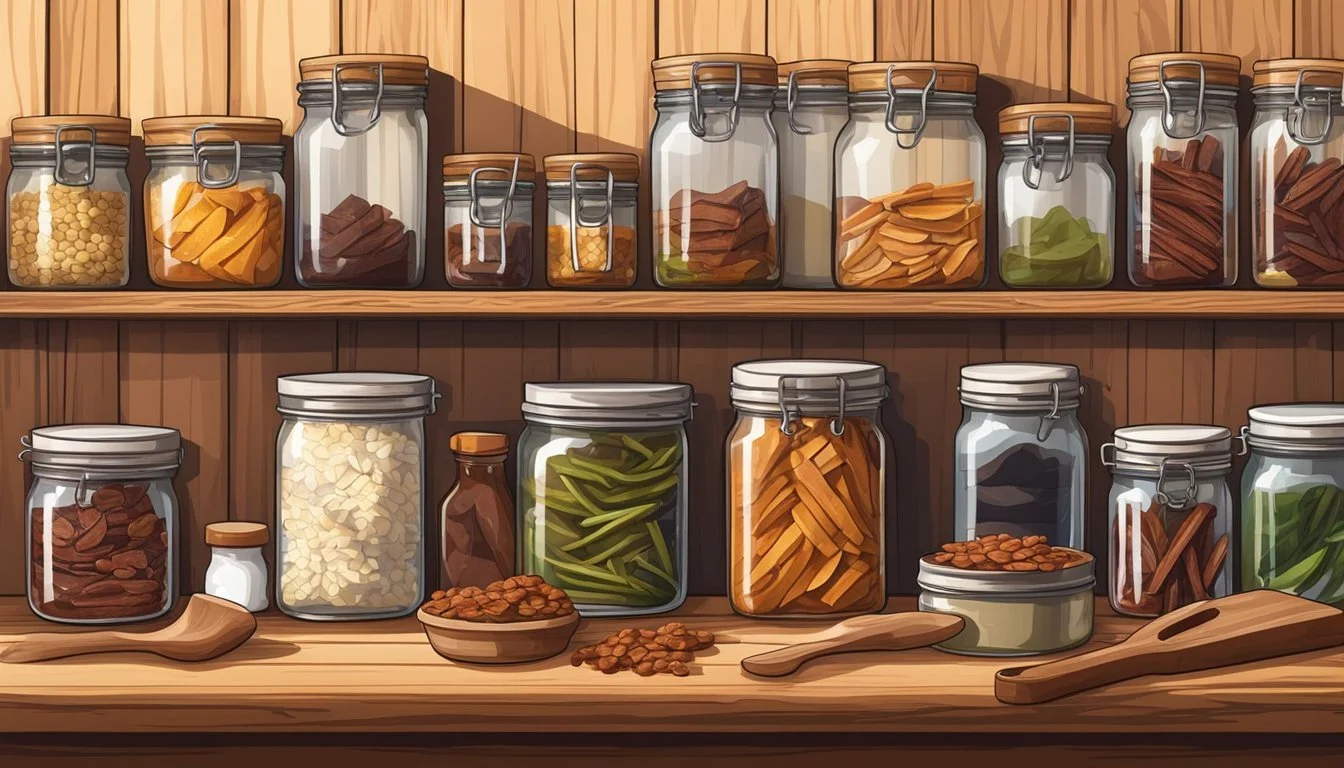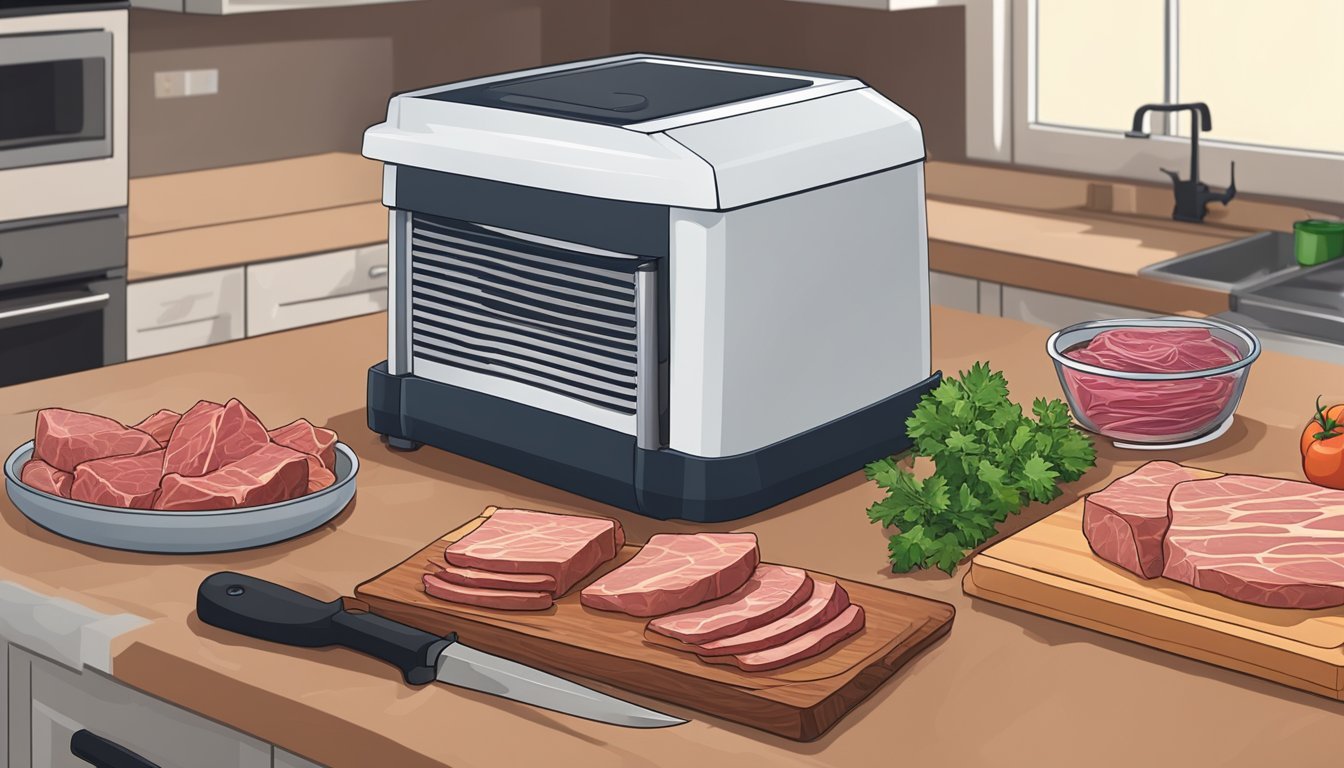Crafting Homemade Duck Jerky
A Step-by-Step Process for Delicious Snacks
Crafting homemade duck jerky provides a rewarding experience for culinary enthusiasts and a delectable, high-protein snack for those on the go. Duck jerky, made from carefully selected duck breast, can be dehydrated or baked to perfection. The process ensures a balance of flavor and preservation, eliminating moisture to extend the snack’s shelf-life while concentrating the meat's natural taste. As an alternative to beef, duck offers a unique flavor profile that lends itself well to a variety of seasonings, ranging from sweet and savory honey sesame to more traditional jerky spices.
Homemade duck jerky starts with the marination process, which infuses the meat with desired flavors and tenderizes it, enhancing both the taste and texture. A high-quality content marinade often includes ingredients like soy sauce, garlic, and other spices that complement the rich, slightly gamey taste of duck. After marinating, the meat is sliced into consistent strips, which is crucial for even drying and texture.
The dehydration phase is critical: setting the correct temperature is vital for safety and quality. Typically, a food dehydrator or oven is used at 160°F (70°C), a temperature high enough to destroy harmful bacteria without compromising the meat's edible quality. Once dehydrated to the point where the strips are dry but still pliable, the jerky is allowed to cool and then stored in airtight containers to maintain its freshness. This homemade snack is not just a healthier alternative to store-bought jerkies but also offers a level of customization in flavor that is not usually available in commercial options.
Selecting Quality Ingredients
When crafting homemade duck jerky, the foundation of a delicious snack begins with selecting high-quality ingredients. The meat’s freshness and leanness will significantly influence the taste and texture of the final product.
Choosing the Right Duck Breast
Selecting fresh duck breast is paramount. It should have a uniform color and be free of any off-odors. A crucial step is to trim away all visible fat, as fat does not dehydrate well and can cause the jerky to spoil faster. For the best results, one should opt for lean cuts of meat, ensuring a better texture and shelf life for the jerky.
Additional Meats Overview
While duck is the primary choice, homemade jerky can also be made from a variety of meats. Wild game such as goose breast provides a robust flavor profile, making it an excellent alternative. Venison is another popular choice for jerky due to its lean quality and rich taste. For those who prefer more traditional options, beef and turkey are reliable choices that are readily available and offer a familiar flavor. It's integral that regardless of the meat chosen, one should always go for the leanest cuts to ensure proper dehydration and preservation.
Preparation Techniques
Proper preparation is essential for creating high-quality homemade duck jerky. The following techniques focus on preparing the meat through specific cutting and tenderizing methods to ensure the best texture and flavor.
Trimming and Slicing
One must trim any excess fat from the duck breasts as fat does not dehydrate well and can cause the jerky to spoil faster. The meat should then be sliced into consistent, thin strips, approximately 1/4 inch thick, to allow for even drying. It's crucial to slice with the grain for jerky that has more chew, or against the grain for a more tender bite.
Freezing for Easier Slicing
To facilitate the slicing process, the duck breasts can be partially frozen for about 1-2 hours. The semi-frozen meat is firmer, making it easier to handle and slice into uniform strips. This step helps prevent the meat from becoming too slippery and minimizes the risk of uneven cuts.
Using a Meat Tenderizer
Although duck meat is generally tender, using a meat tenderizer can help to further soften the fibers, resulting in a more pleasant chewing experience. But be cautious: one should only gently press the meat with the tenderizer, as over-tenderizing can make the strips too thin or even mushy, which is not desirable when making jerky.
Creating the Perfect Marinade
The perfect marinade for duck jerky infuses the meat with flavor and tenderizes it, setting the foundation for a delicious snack. The key is to balance the savory, sweet, and aromatic components in the recipes to enhance the meat's natural taste.
Marinade Basics
A marinade typically consists of acids, such as vinegar or citrus juices, and salt as its base. Salt is crucial not only for flavor but also to help preserve the jerky. In duck jerky recipes, soy sauce often acts as the salty element, contributing a rich umami flavor. Brown sugar is added for a hint of sweetness, which balances the salt and complements the duck's flavor. The proportion of these ingredients can greatly influence the final taste, so they are combined in careful measurement.
Seasoning Combinations
To create complexity in the jerky's flavor profile, a blend of seasonings is used:
Black pepper and ginger for heat and zest.
Onion powder and garlic powder for savoriness.
A touch of red pepper flakes or cloves for a spicy kick.
In some recipes, Worcestershire sauce is included to deepen the tanginess. The key is to ensure that each seasoning is balanced so one does not overpower another.
Exploring Flavor Enhancers
To further tailor the taste, chefs can explore additional flavor enhancers:
Teriyaki sauce provides a sweet and tangy note.
A splash of beer can contribute a subtle bitterness and complexity.
Liquid smoke lends a smoky aroma, emulating the effect of traditional smoking.
For heat enthusiasts, hot sauce introduces a fiery element.
Each enhancer must be used judiciously to complement, rather than dominate, the duck's rich and delicate taste. By mixing and matching these enhancers, one can create a unique marinade that will make homemade duck jerky a standout treat.
Drying and Dehydration Methods
The drying process is pivotal in crafting duck jerky, as it contributes to both the texture and preservation of the meat. Choosing the right dehydration method can significantly enhance the flavor and storage life.
Using a Dehydrator
A dehydrator is an efficient tool to dehydrate duck meat uniformly. The user should first arrange the seasoned duck strips on dehydrator trays, ensuring they do not overlap. It's crucial to set the dehydrator to 165 degrees Fahrenheit and let it run for 5 to 7 hours. It’s advisable to check the meat after 4 hours and periodically thereafter. Jerky is done when it bends and cracks but doesn't break. For best results, users may need to rotate the trays to ensure even drying.
Oven Drying Steps
For those without a dehydrator, the oven drying method is a viable alternative. One should preheat the oven to 165 degrees Fahrenheit and place the seasoned duck on a wire rack over a baking sheet. Drying in the oven typically takes between 4 to 6 hours. To aid the drying process and allow moisture to escape, one should keep the oven door slightly ajar. Similar to dehydrating, the jerky should be checked to ensure it's dried but pliable.
Smoking for Flavor
Smoking not only dries the jerky but also imparts a robust flavor. Those who prefer smoked duck jerky can utilize a smoker. The smoking temperature should be kept around 165 degrees Fahrenheit. The duration may vary, but generally, the smoking process takes several hours, based on the thickness of the jerky slices and the type of smoker used. Regular checks are recommended to achieve the desired dryness without overcooking.
Proper Storage and Preservation
After crafting homemade duck jerky, it's essential to store it properly to maintain its freshness and flavor. The right storage methods ensure that the jerky remains a satisfying snack for as long as possible without spoilage.
Cool and Dry Storage Options
To preserve the quality of duck jerky, individuals should store it in a cool, dry place away from light. This environment minimizes the risk of microbial growth and oxidation. Using an airtight container is crucial to prevent exposure to air and moisture, which can degrade the jerky. Opt for containers such as:
Glass jars with tight-sealing lids
Heavy-duty zip-top bags with all air squeezed out
Food-grade vacuum-sealed bags
Extending Shelf Life with Refrigeration
Refrigeration can further extend the shelf life of duck jerky. By storing jerky in the refrigerator, one capitalizes on the cooler temperatures, which help slow down any potential spoilage. Use the following steps for refrigerated storage:
Wrap the jerky in parchment paper to absorb any excess moisture.
Place the wrapped jerky in an airtight container or a sealable plastic bag.
Store in the refrigerator where it's consistently cold, avoiding the door where the temperature fluctuates more.
Shelf life for properly stored duck jerky in a refrigerator can extend a few weeks to several months, depending on the specific conditions and original freshness of the jerky.
Advanced Tips and Techniques
In crafting homemade duck jerky, mastery of advanced techniques elevates the final product. One's jerky can transcend from simple dried meat to a gourmet snack by perfecting the doneness, diversifying the meat choices, and understanding harmonious pairings.
Testing for Doneness
To ensure duck jerky is safe and has the desired texture, one should dehydrate or bake it until it is dry but still pliable. Doneness can be tested by bending a piece of jerky; if it cracks slightly but does not break, it is ready. Dehydration time can vary based on thickness and moisture content, commonly ranging from 4-6 hours.
Experimenting with Different Meats
While duck is a succulent choice, exploring other meats like beef and salmon can offer a variety in flavor and texture. Beef jerky, notable for its heartiness, often requires a longer dehydration time due to its density. In contrast, salmon jerky, celebrated for its omega-3 content, requires a delicate balance of time and temperature to maintain its integrity.
Homemade Jerky Pairings
Homemade jerky serves as not only a snack but also as an ingredient that can elevate dishes. Duck jerky crumble can be sprinkled over soup for added texture or even included in a charcuterie (What wine goes well with charcuterie?) board. When considering drink pairings, a bold beer complements the meat's savory notes. One can create a multisensory experience by coupling homemade jerky with complementary food and beverages.
Essential Tools and Equipment
Crafting duck jerky at home requires a few critical tools and equipment to ensure a successful and safe experience. Properly selected and operated, these items can elevate a homemade jerky recipe into a delicious and professional-level snack.
Dehydrator Recommendations
A reliable dehydrator is paramount for making duck jerky, as it consistently dries meat at a controlled temperature. This helps prevent bacterial growth while achieving the desired texture. Experts often suggest models with adjustable temperature settings, ideally up to at least 160°F (70°C), as the precise temperature is crucial. Look for dehydrators with positive reviews that confirm even airflow and temperature stability.
Knives and Cutting Surfaces
To prepare duck jerky, precise and clean cuts of meat are necessary. A sharp chef's knife or a fillet knife is recommended to slice duck breasts into uniform 1/4-inch thick strips. It is equally important to use a sturdy cutting board, preferably made from wood or high-density polyethylene, to provide a stable cutting surface and prevent cross-contamination.
Storage Solutions
Once the duck jerky is dehydrated and cooled, it must be stored properly to maintain freshness and prevent spoilage. Airtight containers or heavy-duty resealable plastic bags are ideal options. Containers should be opaque or stored in a dark place to protect the jerky from light, which can cause the fats to spoil quicker. Checking for seals that are both air and moisture resistant is vital based on user reviews and guides.
Safety and Health Considerations
When creating homemade duck jerky, adhering to safety and health guidelines is crucial. These practices help prevent foodborne illnesses and ensure the jerky is safe to consume.
Meat Handling Best Practices
Proper meat handling is vital in the prevention of contamination. One should:
Select fresh duck meat: Always start with high-quality, fresh duck meat, preferably lean cuts to reduce the risk of spoilage.
Wash hands thoroughly: Wash hands with soap and water for at least 20 seconds before and after handling raw duck meat.
Use clean utensils and surfaces: Prioritize cleanliness to avoid cross-contamination with other foods.
Understanding the Role of Heat in Sanitization
Heat treatment is a critical step in sanitizing jerky.
Marinate safely: If the recipe includes marination, ensure that the duck meat is refrigerated during this process to inhibit bacterial growth.
Dry at the right temperature: The drying process, whether in a dehydrator or oven, should reach an internal temperature of 160°F (71°C) - this temperature is necessary to kill harmful pathogens.
Navigating Food Allergies and Sensitivities
Knowing and addressing potential allergens is key in jerky preparation.
Identify common allergens: Include a list of ingredients used in the marinade or spices to inform consumers about potential allergens like soy, wheat, or nuts.
Separate equipment use: If creating multiple batches, use separate equipment to avoid cross-contamination between allergens and non-allergens.
Conclusion
Making duck jerky at home allows for a customizable dehydrating experience, tailored to personal taste preferences. The key step is maintaining a consistent temperature of 160°F (70°C) during dehydration, which ensures the safety and quality of the jerky.
By following simple guidelines, such as slicing the meat to the appropriate thickness and marinating it with chosen flavors, one can produce a delicious product. Homemade jerky also offers the benefit of knowing exactly what ingredients are used, providing a healthier and more natural snack.
Once the jerky is properly dried to be dry yet pliable, it should be allowed to cool. After cooling, storing the jerky in an airtight container helps to preserve its freshness and extend its shelf life.
The satisfaction of crafting homemade duck jerky is twofold: one enjoys the creative process and the resulting savory snack. With patience and attention to detail, one can achieve a high level of quality that rivals commercially available options.
Remember:
Set the right temperature
Slice meat evenly
Marinate with personal spice mix
Dehydrate until the correct texture is achieved
Store in a cool, dry place
Homemade jerky is a testament to the maker's dedication to a quality lifestyle and culinary adventure.
Appendix: Resources and References
In this section, readers will find curated materials that serve as a valuable point of reference for making duck jerky at home. These resources have been divided into cookbooks and guides that can be purchased or accessed through various platforms, as well as online resources that provide complementary information.
Cookbooks and Guides
For readers inclined towards comprehensive guides and cookbooks, the following selection offers detailed insights into preparing duck jerky:
"The Dehydrator Bible" by Jennifer MacKenzie, Jay Nutt, & Don Mercer: This book includes various recipes for dehydrated foods, including meat jerky.
"Jerky Everything" by Pamela Braun: Offers a plethora of jerky recipes and covers different techniques and flavors.
Many of these guides can be found on platforms such as Amazon, and readers may utilize the Amazon Associates program to find deals and recommendations on related jerky-making tools and ingredients.
Online Resources
The internet houses a vast trove of duck jerky recipes and preparation methods. Here are some valuable online resources:
Food52: Offers a step-by-step tutorial for making duck jerky, with readers benefiting from community insights and tips.
Bob’s Sporting Goods: Features a unique recipe and highlights specific techniques like marinating and tenderizing duck meat for jerky preparation.
Additionally, various food blogs and online cooking forums provide an interactive platform for discussions and personal advice from experienced jerky makers.










